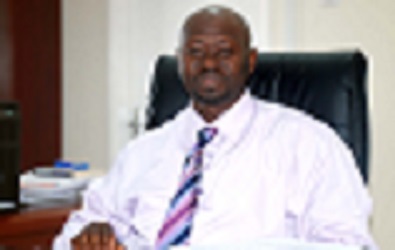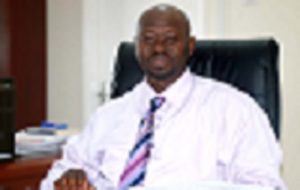
By Assan Sallah
The Gambia National Transport Union authorities have accused Senegal of being selfishly over-protective of their interest to the detriment of bilateral and multilateral agreements. In 2018 The Gambia and Senegal entered into a transport agreement signed by Gambia’s Transport minister Bai Lamin Jobe and Senegal’s former Transport minister Abdoulaye Douda Diallo. The objective of this agreement was to strengthen the Ecowas protocol on free movements of people, goods and services.
In an interview, Seedy Kanyi, the General Manager of Gambia Transport Service Corporation (GTSC) affirmed that the transport problem has been existing since former president Jammeh’s era. He said initially, from December 2016 it was only one-way operation before the Senegalese bus company ‘Dakar Dem Dikk’ started operations three weeks ago.
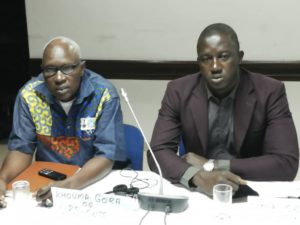
The General Manager explained that the GTSC started operation since 2017 on a low scale by sending one bus per day, per direction. “One bus departs from Senegal and one bus departs from Banjul daily. Due to high demand, it was increased to two buses per day in 2018”. He added that it got to a point in 2018 when three buses depart on alternate days. “When Senegalese transport union observed that the operation from Banjul is affecting their market, they started to complain and reacted by blocking our buses from entering Senegal. They decided that they would allow only a bus per day, per direction,” he further intimated.
“The GTSC bus is a 50-seater whilst the Senegalese local transport union’s ‘SET PALACE’ has capacity of seven, thus they argued that this will adversely affect their customer base. So basically, the Senegalese commercial drivers are the problems here but not the public transport company called Dakar Dem Dikk,” Kanyi observed.
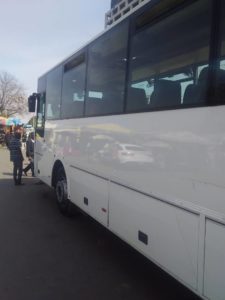
Gambian authorities’ border encounter
In their attempt to get first-hand experience and gather evidence of the hostility orchestrated by the Senegalese drivers at the border, the Gambian transport officials last Friday, February 14th decided to make a trip to the Amdallai – Karang Border. “We have given Gambia government three solid evidences of how Senegal violated the Ecowas and Bilateral agreements within one month; whilst on the other hand, Senegal is conveniently plying into the Gambian route either in transit to Casamance or directly into The Gambia without hindrance ,” they reacted in a telephone interview.
Narrating the Friday incident at the border, the GTSC General Manager described Senegal’s behavior towards Gambia and the violation of the bilateral agreement in particular as unacceptable and unfair. “The Senegalese security at the border delayed our bus last Friday and denied us entry for no reason. They started asking certain questions which they have answers to. This was done to delay the Gambian bus so that the Senegalese community in Karang led by their transport union leaders, to have enough time, people and access to block the Gambian bus from entering Senegal. They were constantly communicating with the transport union of Senegal,” he stated.
Asked about the reaction of the Gambian security forces towards the misconduct of the Senegalese border security, Mr. Kanyi said the reaction of the Gambian security forces at the border was cautious because of the experience they had in the early 2000s during the football crisis between the two countries. He recalled that during the said crisis, the Amdallai Police Station was burnt by the invading Senegalese crowd, saying, it is because of that experience that the Gambian security officers were very cautious in the way they handled the incident. He disclosed that the security guards advised the Gambian team to exercise maximum restraint, take a diplomatic approach and allow sanity to prevail.
“Despite the relations between our two countries, ironically Senegalese people are stopping Gambian vehicles from entering their country whilst they are allowing vehicles from Mali, Mauritania, Guinea Bissau and Guinea Conakry, to enter Senegal without restrictions or hindrance,” he wondered.
Omar Ceesay, the Gambia National Transport Union’s president had earlier announced that beginning Wednesday, 19th February 2020, his union will close all borders of the country and will not allow any commercial vehicle from Senegal to enter the Gambian territory.
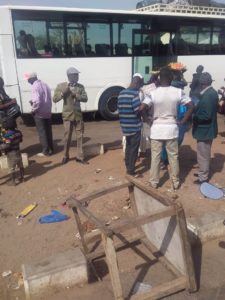
He recalled that after the signing of the bilateral agreement between The Gambia and Senegal in 2018, The Gambia government issued 100 permits for vehicles (commercial vehicles) but GTSC bus service and Dakar Dem Dikk (public transport companies from the two countries) were exempted from the permits, as they are free to enter any of the two countries without permit.
According to him, Senegalese government issued 150 permits to their commercial vehicles to enter Gambia. He disclosed that the Gambia government gave them permit to begin operation on 6th January 2020. This, he said, means that anyone with permit from the Gambia National Transport Union could begin operation between Gambia and Senegal, anytime from January 6.
Despite this agreement, Mr. Ceesay recalled that on 10th January 2020, a private bus with registration number BJL 0438 R, belonging to Mr. Doudou Jobe, a Gambian businessman based in Dakar, was stopped at the border by the Senegalese drivers at Karang and the bus returned to The Gambia.
He said the Senegalese drivers at Karang, who are all members of their transport union, insisted that the passengers in the bus should come down and join the commercial vehicles from the garage at Karang.
He further revealed that on 12th January, another bus from the GTSC (the second bus which goes to Senegal in the afternoon), was also intercepted at the border and only got released after five hours of negotiations.
The following day, Mr. Ceesay went on, another GTSC bus left in the afternoon again for a second service but was also stopped at the border. Despite the interventions by the authorities, he said, the Senegalese refused.

On the account of actions taken since January 2020 here is what Omar Ceesay had to say:
“We wrote a letter to the Gambia’s Ministry of Transport, dated 27th January 2020, and informed them that if Senegal does not stop blocking Gambian vehicles at the border, then we will also stop their vehicles from entering Gambia and this will begin on the 10th February. The Ministry of Foreign Affairs sent us (the Gambia National Transport Union) a letter dated 31st January and invited us to a meeting on 11th February at Karang, to resolve the matter. We also sent a copy of the letter to the IGP and Ministry of Trade”.
He went on: “So we cancelled the first planned operation on 10th February and on 11th February, a high-powered delegation comprising myself (Omar Ceesay); the Minister of Trade, Minister of Transport, Minster of Foreign Affairs, Gambia Revenue Authority, Gambia Police Force, Gambia Ports Authority, National Roads Authority, Immigration Department, GCCI, GTSC, Gambia Armed Forces and the Officials of the State Intelligence Agency (SIS), travelled to Karang for a meeting with the Senegalese authorities about this issues”.
According to Ceesay, the Senegalese authorities boycotted the meeting and only one police officer who was part of those attached to the border, attended the meeting from the Senegalese side. “No Senegalese authority or their transport union member showed up for the meeting. We had the meeting alone among ourselves and only one police officer of Senegal joined us in the meeting. We discussed and we agreed for the GTSC to make a test by sending another bus on Friday, 14th February,” he disclosed.
Shedding light on the drama at the border when he and five of his executives together with some journalists set out to gather evidence, Ceesay said upon arrival at the border, the Gambian immigration provided laissez passer (entry permit) to some of the journalists who do not possess Gambian identity card and when they reached at Karang, the passengers went to the Senegalese police for clearance.
“The Senegalese police officer took the laissez passer issued to the journalists and other people who do not have Gambian ID cards (6 people) and detained them at the back of the station. While I was going into the police station to check our people, the police officer held the hand of journalist Modou Lamin Badjie of Star FM and started harassing him. He assaulted the journalist, calling him a criminal. His colleague journalists protested, and the police officer shouted at them. I came to beg him, but he refused to release them. He insisted that his boss, (the commissioner) must come before he releases them. I approached his boss and he too said these people are rude and I should leave them there. I begged his pardon and he later released five of them and but journalist Modou Lamin Badjie was detained in the cell.
“I went out and called Dodou Jobe, and he called the security at the border and Modou Lamin Badjie was released few minutes later after Jobe’s phone call. We moved on with the GTSC bus and continued with the journey and just around 500 meters before the main Senegalese garage in Karang, we realized that the road was blocked by the Senegalese community in Karang and the drivers at the garage.
When we reached the blockage, I dropped and talked to them. They insisted that only one bus from Gambia is allowed to enter. I reminded them their action is against the Ecowas protocols on free movement of people, goods and services and also against the agreement signed between The Gambia and Senegal. I engaged them and they started throwing stones, and carried sticks coming towards us. They threatened to set our bus on fire. Gambian security officers in mufti were present and studying the situation while giving reports to the Gambian authorities back home. No Senegalese security came to the scene. We then turned back and headed home.”
Upon arrival at the border, Mr. Ceesay said they attempted to cross into The Gambia without stopping at the Senegalese police post. He said the Senegalese police came and asked why they didn’t stop, and he responded: ‘your people wanted to kill us so why should we stop here’.
“And he said, even when we were going, he knew that we will not pass through. He said it is the drivers who chased us away but not the security and I said ‘no, it is all of you and your government’. We then wrote our statement at the Gambian Police Station at the border and we had interview with the journalists, before heading home,” Mr Ceesay concluded.
Gora Khouma, Secretary General of the Union des Routiers du Sénégal (Urs), said his movement has agreed to respect and abide by the Ecowas protocol to open all borders and allow free movements of people, goods and services. He therefore argued that they must either agree to it and have a level playing field or close all borders for all Ecowas nations.
Blaming the Senegalese government, Mr. Khouma queried why their government would watch drivers at the border open the border for Guinea Bissau, Guinea Conakry, Mali and Mauritania and close it for Gambia.
“The Senegalese state has its security at the border; so, if drivers at Karang deny Gambian buses entry and they are aware of the Ecowas protocol and the bilateral agreement we have with Gambia, why can’t they stop them? Why can’t they ask them not to block the road or arrest them, because if that problem is not solved, it could bring trouble between the two countries,” Gora Khouma stressed.
On his part, Mbaye Cisse alias Mbaye Tyson, the Chef de Garage of Karang said the drivers at Karang disagree with the decision for their commercial vehicles to drive from Dakar to Barra, instead of stopping at their car park in Karang.

